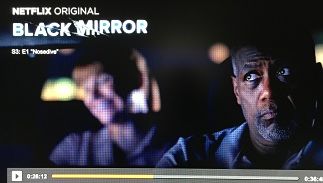One of the writers for Black Mirror, a Netflix Original, used to drive for Uber; I just can’t figure out who. “Nosedive,” the 1st episode of Season 3 effectively skewers social media culture, taking one-to-five star rating systems to crazy extremes.
The full third season of Black Mirror, a Twilight Zone for the Digital Age, dropped last week, and, typical of Netflix, is available for binge watching in its entirety.
The presentation of the ride-hailing rating system largely rings true for me as a driver.
Five-Star Ratings Anxiety Well Represented By Black Mirror Writers
“Nosedive” presents some days in the life of a social climber, Lacie Pound (Bryce Dallas Howard). Set in the not-too-distant future, contact lens implants function like Google glasses, using facial recognition to identify every passer-by, giving their name and their ranking on a scale of one-to-five. People can rate anybody and everybody they encounter, no matter how trivial the encounter.
Lacie needs a higher rating in order to afford a better apartment. She’s only a 4.2.
In this society, low ratings will get you locked out of work. This should sound familiar to ride-hailing drivers. Uber and Lyft drivers typically get bumped off the system when they fall below 4.6. The workplace in this show is much more forgiving, only locking out workers if they fall below 2.5.
Chester (Kadiff Kirwan), a coworker of Lacie’s, has fallen to a 2.4, and the office doors won’t open. He meets Lacie on her way into work.
“I just need a few stars, please,” he begs.
Lacie calls a cab to take her to the airport (24:36). Arguing with her brother, she doesn’t respond to the honk signaling the cab’s arrival. (This might be the only thing that the episode doesn’t get right. Ubers generally don’t honk. The app lets the driver know that they’ve arrived. But the car is marked “taxi,” so perhaps the behavior fits.)
She forgets something and has to go back for it. The taxi honks again. Customers frequently leave us waiting; that’s annoying since they can see us approaching on their phones.
In the ride, she ignores the driver and carries on a loud, self-absorbed conversation with her friend. The driver (Jeffrey Davenport) is unamused.
After getting out of the cab, Lacie walks to the driver, whose window is rolled down.
“And here’s your tip,” she says effusively with a giggle. She raises her ever-present mobile device and rates him 5-stars.
He remains nonplussed, wordlessly rating her on his device before pulling from the curb.
“Thank you,” she calls out after him.
Almost immediately, the descending string of notes from her phone tells her that the driver, who himself is only a 3.2, has given her a poor rating. His one-star drops Lacie to a 4.2.
Uber Drivers Will Relate To “Nosedive”
While “Nosedive” effectively parodies ratings anxiety created by one-to-five star systems, especially in ride-hailing where drivers rate riders and visa versa, not everything fits perfectly. Uber’s rating system works even less effectively than what’s portrayed here, because there is no immediate feedback. All the feedback is made anonymous.
In the show, people aim their devices like guns when they rate each other. They turn and immediately see what the other person rated them.
With ride-hailing companies, like Uber and Lyft in the United States, riders might be prompted to rate their drivers immediately, they do not have to follow through until much later, if at all. Drivers often see their ratings increase or decrease, but they have no idea which rides caused the movement.
The painful part of the show, especially for Uber drivers, is when Lacie offers the rating as the tip. Uber has created an environment in which riders think they don’t have to tip, even when they are late to the ride and rude during the ride. This creates an environment in which some drivers rate their riders one-star if they don’t tip.
See my article, “9 Reasons To Tip Your Uber Driver.”
But unlike for drivers, ratings for riders largely make little difference in the service.
The whole system reinforces passive aggressive, fake behavior, which is the opposite of Lacie’s ultimate fate.
Check out the episode and let me know what you thought.
Netflix’s Black Mirror page. Note: this is not an affiliate link. I am not getting paid to endorse, or review, this show.
